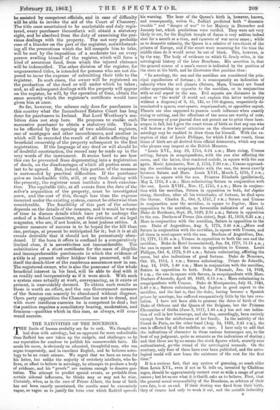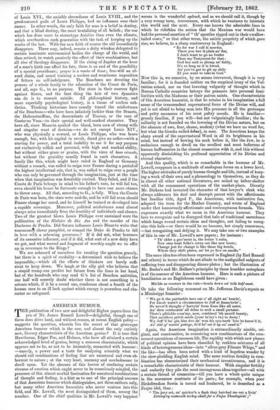THE NATIVITIES OF THE BOURBONS. T HE limits of human credulity
are far to seek. We thought we had done with astrology, but an opponent far more redoubtable than Zadkiel has now taken up the cudgels, and challenges us by our reputation for candour to publish his unanswerable facts. He sends his name, is obviously an educated, thoughtful man, who can argue temperately, and in excellent English, and he believes astro- logy to be an exact science. We regret that we have no room for his letter, but unlike the majority of crotchety intellects, who be- lieve, or affect to believe in astrology, he attempts to produce a body of evidence, and his "proofs" are curious enough to deserve quo- tation. The attempt to predict special events, as probable from certain sidereal influences, he thinks may or may not be wise. Certainly, when, as in the case of Prince Albert, the hour of birth has not been exactly ascertained, the results must be excessively vague, so vague as to justify the term over which Zadkiel spreads his warning. The hour of the Queen's birth is, however, known, and consequently, writes G., Zadkiel predicted both "domestic trouble" and "danger of war" to her Majesty in December and January last, which predictions were verified. They were not very likely to err, for the English temple of Janus is very seldom indeed shut for a month at a time, and rumours of war never cease ; while as to domestic calamity, the Queen is a relative of two-thirds of the princes of Europe, and if the court wore mourning for time time the middle class do it would never be out of black. This, however, is by the way. The body of evidence on which G. firmly relies, is the astrological history of the later Bourbons. His assertion is, that the general course of a man's career is indicated by the position of the stars at his birth, and he illustrates that position thus: "In astrology, the sun and the meridian are considered the pria. cipal significators of fortune ; it is consequently an indication of calamity when the evil planets (Saturn, Mars, Uranus) are found either approaching or opposite to the meridian, or in conjunction with or evil aspect to the sun. Evil aspects are distances in the zodiac or the world' (I could not explain this latter technicality without a diagram) of 9, 45, 135, or 180 degrees, respectively de, nominated a square, semi-square, sesquiquadrate. or opposition aspect. Planets are also supposed to possess much influence when exactly rising or setting, and the affections of the moon are worthy of note, The economy of your journal does not permit me to print these horo- scopes in full, but I give the exact times of birth so that any one who will bestow a few hours' attention on the elementary principles of astrology may be enabled to draw them for himself. With the ex- ception of that of Louis Philippe, for which I do not vouch, these times of birth are all derived from official documents, which any one who pleases may inspect at the British Museum.
"Louis XVI., Aug. 23, 1754, 6.24 A.M.; Mars rising, Uranus setting, Saturn in sesquiquadrate, with the sun also afflicting the moon, and the latter, thus rendered malefic, in square with the min again. Marie Antoinette, Nov. 2, 1755, 7.30 rat,; Uranus approach- ing the meridian in sesquiquadrate with the sun, the moon exactly between Saturn and Mars. Louis XVII., March 7, 1785, 7 rat.; Urrums in square with the sun. Princess Elizabeth (guillotined), May 3, 1761, 2 A.M.; Mars culminating Saturn in conjunction with the sun. Louis X.VIII., Nov. 17, 1755, 4 4.M. ; Mars in conjunc- tion with the meridian, Saturn in opposition to both, but Jupiter rising, therefore, after all his vicissitudes of fortune, be died upon the throne. Charles X., Oat. 9, 1757, 7 rat.; Saturn and Uranus in conjunction near the meridian, in square to Jupiter, Mars in opposition to the meridian, no favourable indication of any kind. Duke de Bordeaux, Sept. 29, 1820, 2.35 A.M. Saturn in opposition to the sun. Duchess of Parma (his sister), Sept. 21, 1819, 6.35 A.B. ; Mars in conjunction with the meridian, Saturn in opposition to the sun. Duke of Angouleme, Aug. 6, 1775, 3.45 P.M.; sMars and Saturn in conjunction with the meridian, in square with Uranus, and all three in semi-square with time sun. Duchess of Angouleme, Dec. 19, 1778, 11.25 A.m.; Uranus in opposition to both the sun and the meridian. Duke de Berri (assassinated), Jan. 21, 1778, 11.15 A.m.; the sun in square and the moon in opposition to Uranus. Louis Philippe, Oct. 6, 1773, 9.40 ea'.; Saturn culminating, afflicting the moon, but also indications of good fortune. Duke de Nemours, Oct. 25, 1814, 5 P.M.; Saturn culminating. Prince de Joinville, Aug. 14, 1818, 1.40 rat. ; Mars in conjunction with the meridian, Saturn in opposition to both. Duke d'Aumale, Jan. 14, 1822, 9 ; the sun in square with Saturn, in sesquiquadrate with Mars.
Duchess d'A.umale, April 26, 1822, 6.15 r.m. ; culminating in sesquiquadrate with Uranus. Duke de Montpensier, July 31, 1824, 5.40 P.M. ; Saturn culminating, but Jupiter in good aspect to the meridian, and the fact is, that the duke, having become a Spanish prince by marriage, has suffered comparatively little by the late revo- lution. I have not been able to procure the dates of birth of the Duke of Orleans and the Queen of the Belgians, but the Princess Clementine of Gotha (June 3, 1817, 1.40 A.M.) has not one indica- tion of evil in her horoscope, and she has, accordingly, been entirely exempt from the misfortunes of her family. In the nativity of the Count de Paris, on the other hand (Aug. 24, 1838, 2.45 rm.), the sun is afflicted by all the malefies at once. I have only to add that the indications of character in these various horoscopes are, to the best of my judgment, quite as accurate as the indications of destiny ; and that these are by no means the stock figures which, scarcely ever authenticated, go .the round of the astrological manuals. On the contrary, only four of them have ever been published, and the astro- logical world will now learn the existence of the rest for the first time."
It is a curious fact, that any system of guessing, so much older than Louis XVI., even if not as G. tells us, invented by Chaldean sages, 'should be approximately correct over so wide a range of great names; but let us see what it is thatG. asks us to believe. First, that the general moral responsibility of the Bourbons, as arbiters of their own fate, is at an end. If their destiny was fixed from their birth, they of course had only to work it out, and the amiable imbecility of Louis XVI., the amiable shrewdness of Louis XVIII., and the good-natured guile of Louis Philippe, had no influence over their career. In other words, the only faith for man is a belief in destiny, and that a blind destiny, the most brutalizing of all beliefs ; the one which has done more to stereotype Asiatics than even the climate, which overburdens each generation with the task of keeping up the works of the last. With the new faith of course the old immediately disappears. There may, indeed, remain a deity wholhas delegated to certain inanimate astronomical bodies the charge of the world, and then retired, to watch passively the effect of their combinations, but all else of theology disappears. If the rising of Jupiter at the hour of a man's birth can affect his fate, there is an end of the possibility of a special providence; prayer is a waste of time; free-will an ab- surd claim, and moral training a useless aud wearisome imposition of fetters on self-indulgence. The Bourbons are devoting the powers of a whole family to the education of the Count de Paris, and all, says G., to no purpose. The stars in their courses fight against Sisera, and the best thing the heir of two dynasties can do is to commit suicide. All philosophical history, and more especially psychological history, is a tissue of useless sub- tleties. Thinking historians have usually traced the misfortunes of the Bourbons—who have been infinitely luckier than the Stuarts, the Hohenstauffens, the descendants of Timour, or the race of Gustavus Vasa—to their special and well-marked character. They have all, since Mazarin spoiled the blood, been men of strong wills and singular want of decision—we do not except Louis XIV., who was physically a coward, or Louis Philippe, who was brave enough, but, with his capital in revolt, dared give no order—with a craving for power, and a total inability to use it for any purpose not exclusively selfish and personal, with high and marked ability, but without either grace or genius, with the vices of bons vivant; but without the geniality usually found in such characters. A family like this, which might have ruled in England or Germany without a remark, was called to reign over France during a period of the highest intellectual stir, that is, was called to reign over a people who can only be governed through the imagination, just at the time when that imagination was feverishly excited. They failed, and if the Comte de Paris belongs in mind to his father's race, he will fail too, even should his house be fortunate enough to have one more chance to throw away. All that, according to G., is folly. When the Comte de Paris was born, the stars were malefic, and he will fail even should France change her mood, and he himself be trained or developed into a capable sovereign. Moreover, political misfortunes must almost always arise immediately from the hostility of individuals and classes. Two of the greatest blows Louis Philippe ever sustained were the publication of the Histoire de Div Ass and the .murder of the Duchesse de Praslin. Did Saturn influence Louis Blanc to write that venoinoust, clever pamphlet, or compel the Duke de Prasliu to fall in love with a scheming governess ? If it did not, what becomes of its causative influence, and if it did, what sort of a new deity have we got, and what morsel and fragment of worship ought we to offer up in reverence to the Rings?
We are ashamed of ourselves for treating the question gravely, but there is a spirit of credulity—a determined wish to believe the impossible,—which all the efforts of thinkers are barely suffi- cient to keep, down. We laugh at the silly girl who believes that a stupid tramp can predict her future from the lines in her hand, but of the hundreds who may read G.'s list of Bourbon nativities, one half will secretly doubt whether there is not something in a science which, if it be a sound one, condemns about a fourth of the human race to an ill luck against which energy is powerless and cha- racter no safeguard.































 Previous page
Previous page